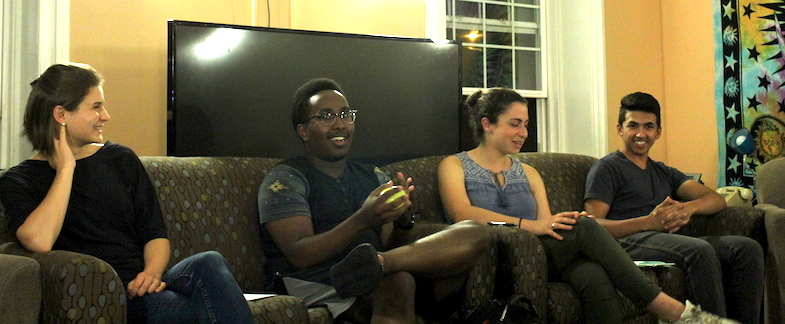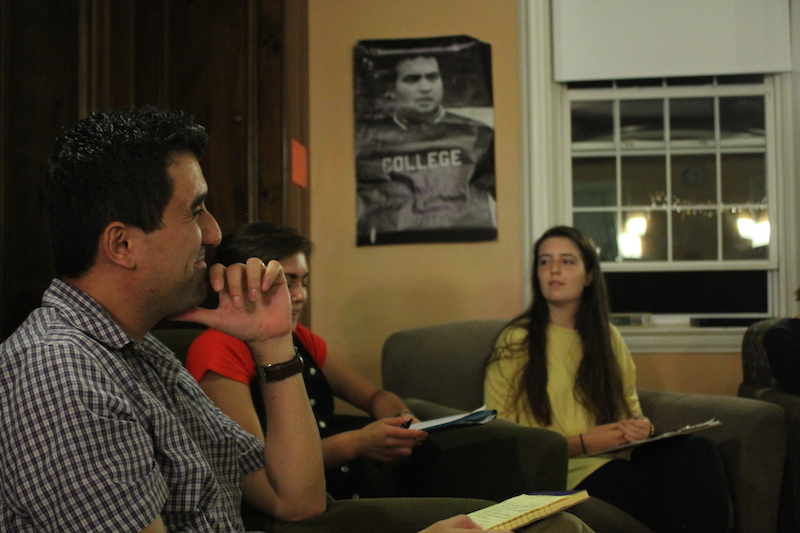Students Reflect on Being Religious at Bowdoin
By Philip Kiefer '18
When a group of six students sat down at Reed House last week to talk about the role religion has played in their lives at Bowdoin, it became clear that, despite the group’s diversity of spiritual beliefs, identifying with religious traditions on Bowdoin’s campus has shaped their experiences in similar ways.
The event, billed as a panel on religious diversity, was moderated by Carly Berlin ’18, a co-president of the Jewish student group Hillel, and Eduardo Pazos, director of Religious and Spiritual Life.
The purpose of the panel was, as Pazos put it in introducing the event, to “normalize the discourse of religion on campus – to give us permission to talk about it.” He added, “We’re not speaking on behalf of everyone and their religious experiences, simply expressing the individual experiences of students on this panel.”
Bridget Hoke ’20, a resident of Reed House, organized the panel with Pazos’s help, in part because she wanted a space to investigate her own spirituality alongside others. Hoke, who was raised Catholic and participated in the panel, described herself as “searching for a new religion.” Part of this process of searching for her is understanding the spirituality of others.

“Reed put on a Shabbat dinner a few weeks ago, and it was a great community builder. It made me want to know more about other people’s religious backgrounds,” she said.
The discussion began quietly, with the panelists sitting in olive armchairs set in a semi-circle at one end of the Reed living room. They introduced themselves in turn by describing their own religious upbringing and current relationship to religion. All of the students were raised in households where religion, or at least the cultural traditions associated with religion, was prominent.
“My mom’s side of the family is very Hindu, while my dad is very atheist, and I would describe myself as agnostic,” said Ural Mishra ’20. “So I don’t practice religion, but it is part of the Nepalese culture I come from in day-to-day practices that transcend their religious roots. Things like the importance we place on family and the way I interact with my grandparents, those things encapsulate Nepali life.”
Some, like Mishra, described themselves as agnostic. Others, like Hoke, were in the process of questioning their religious identities. Still others described going through periods of questioning and reaffirming their faiths at Bowdoin.
Sophie Friedman ’20, explained that she has been pushed to explore her practice of Judaism since coming to Bowdoin. “My dad spearheaded the practice of Judaism at home, you know, making sure we had Shabbat dinners. But my grandparents are Holocaust survivors, so our family’s relationship to religion is complicated. I went to a K-8 Jewish school, but I attended a secular high school that was seriously intellectual. It felt like it wasn’t compatible with religion.”
She continued, “Then I had a moment during High Holidays last year where I thought to myself, ‘Why am I still sitting here?’ Then I launched into all these other questions. Why am I at Bowdoin? What do I want from this experience?”
“But this summer, I worked at a ranch camp with a lot of Christians who all believed in God. And it was so different from all the intellectual cynicism I grew up around in New York, but I found myself wondering if the ranchers seemed more fulfilled. And what I’ve been realizing is that these questions aren’t unique to me or Judaism. These are universal, spiritual questions that can be asked all the time.”
The other panelists echoed Friedman, in that they had all found it difficult to reconcile their identities as intellectuals at Bowdoin with their religious identities.
“The main tension I feel at Bowdoin is in the classroom,” Hoke explained. “I see this dichotomy of religion and intellect. In a seminar, I remember once asking, ‘Isn’t it just as logical to believe in God as not believe in God?’”
Pazos, reading from a question passed from the audience on a notecard, asked, “Have you ever felt embarrassed by your faith at Bowdoin?”
Viviane Kostin ’19, a co-president of the Catholic Student Union who noted that she prayed daily, and someday might like to go to Mass every morning, laughed and answered, “An emphatic nod sums that up.”
Sydney Smith ’19 said, “My embarrassment comes not from what other people think, but what I think about myself.”
But religion has also provided a sense of community for the panelists. Mohamed Nur ’19 remembered celebrating Eid during his freshman year, when a group of students from the Muslim Student Association went down to Portland for services. Nur, who grew up in Portland, got the chance to introduce his friends from home to his new friends in the MSA. “I haven’t always felt comfortable with my faith because of the persecution that’s come along with it. But this was such a welcoming, positive experience early on at Bowdoin,” he said.